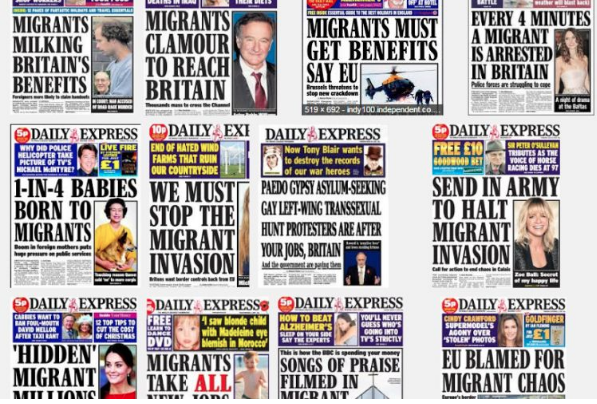By Jack Yates
In Britain, it is undeniable that national newspapers hold tremendous power; they help to shape national opinion, and even influence elections. The Sun, for example, has backed the winner in every single General Election for almost half a century. As a result, they have played a substantial role in creating the current, overwhelmingly negative discourse surrounding immigration. Only through evaluating both how and why this happens can we hope to bring about change, thus it is necessary to examine the language used by newspapers, the production processes that allow this to fester, and the wider public opinion of migration.

A thorough report by the Migration Observatory gives us a quantitative look at the language used by British newspapers. This report utilised a computer-aided analysis of over 58,000 news stories, consisting of around 43 million words. This found that ‘illegal’ was the most common preceding word to ‘immigrants’, and ‘failed’ was the most common for asylum seekers. The words ‘terrorist’, ‘sham’, and ‘suspected’ occurred with a disturbing frequency, as did ‘thousands’ and ‘millions’ – which we can safely assume were sensationalist stories written to portray migrants as dangerous, and over inflate their numbers (13% of all the analysed articles had some reference to the number of migrants entering the UK). Disgustingly dehumanising language like ‘surge’ ‘wave’ and ‘flood’ are used to reinforce the exaggerated view of migration levels, as too is the usage of ‘invasion’ and ‘plague’. Any media organisation using such language to refer to their fellow human beings should be ashamed, but sadly they are not and this has no doubt fostered a toxic public opinion.
Despite the sheer scale of coverage focused on migrants, there was a noticeable lack of divergence in opinion; 46% outright portrayed migrants and migration as a threat, and played on the trope of migrants as villains. 38% talked of migrants in terms of victimhood, which is more promising, but still not necessarily reassuring on its own; sympathy does not always mean support, and has the potential to perpetuate the dangerous view that Britain is superior, or somewhat of a saviour to migrants. Only 10% presented migration as a benefit, and even then, this was mainly framed in economic rather than human or moral terms. The coverage also had a distinct lack of input from migrants themselves; direct references from migrants were extremely rare, and when they were found they were overwhelmingly presented as victims. While the portrayal of migrants as victims may seem, on the surface, to be relatively supportive, it leads to concerns that not only may this not be useful in the longer term in allowing the public to have an equal relationship with migrants, rather than one that only lends support due to suffering, it also forces those rare voices to relive trauma. Emotional stories can garner support, but they also enforce a harmful narrative that support is only necessary in exceptional circumstances.
To understand better how this situation in the media has been created, it is necessary to look at the process of news production itself. A study by the Reminder Project found that their sample was dominated by men, with 19 men surveyed compared to only seven women, a trend which reflects the media as a whole. A majority of newspaper staff interviewed declared that their publication was right-leaning politically, and those working for tabloid or mid-market newspapers also viewed their publication to be socially conservative. Staff give us an insight into the attitudes towards migrants that make it into publication, and also demonstrate a class-based bias, with one saying “I wouldn’t typically think of someone who is working for [Oxford] university from Spain as a migrant, whereas I would tend to think – and this might be completely wrong – but I would think of someone coming from Romania to pick strawberries as a migrant worker.”
This shows that not only does the nationality of the migrant shape their treatment from the press, but also their class background. In addition, the above quote demonstrates that migrants are arranged hierarchically in relation to immigration status, namely which type of UK Visa they hold. The journalists interviewed also admitted that they believed that the term ‘migrant’ was a negatively loaded term, and some even claimed that they talked about EU migrants when they wanted to promote the ‘Brexit agenda’, showing that they intentionally refer to different groups of migrants depending on what reaction they are seeking.

Brexit, and right-wing populism as a whole, is a symptom of an increasingly hostile environment for migrants, but it is important to note that this hostility is racialised, whether they hold British citizenship or not. This demonstrates that not only is anti-immigration sentiment born from prejudice, but it also casts a light on the lack of coherent knowledge surrounding immigration. Surveys show that Brits believe that about 25% of the population is made up of immigrants, when the reality is around half this figure. It is also a popular misconception that immigration leads to a rise in crime and unemployment, and a reduction in the quality of NHS service, when all evidence points towards the fact that this is simply not the case. This is somewhat of a self-reinforcing bias, but it is also heavily influenced by the overwhelmingly negative or misleading coverage of migration from the media.
It is clear that the language used by our media, and the political and social biases of those who own and work for them has created an environment in which migrants are viewed with hostility. While facts and figures will not be enough alone to change the misperception and denigration that migrants face, understanding the role that the media plays gives us a foothold. Migrants must be treated with respect and humanity, and only by taking on the media representation that perpetuates public attitudes can we counter this.

Jack Yates is a content writer for the Immigration Advice Service; an organisation of immigration lawyers.


